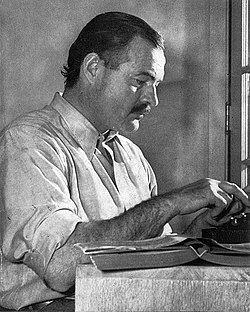Ernest Hemingway Quote
When you love you wish to do things for. You wish to sacrifice for. You wish to serve.
Ernest Hemingway
When you love you wish to do things for. You wish to sacrifice for. You wish to serve.
Tags:
self sacrifice
Related Quotes
If the baser instinct of rampant self-preservation adamantly refuses to surrender itself to the infinitely greater call of self-sacrifice, in attempting to save our lives we will have in reality compl...
Craig D. Lounsbrough
Tags:
call, calling, destroy, generosity, giving, instinct, legacies, legacy, memorial day, memorials
Someone has to be stoic, for the sake of, in spite of, and in the face of all those who are, not. Someone, has to be serious. Someone has to choose to forgo choice, so that there is an option left for...
Justin K. McFarlane Beau
Tags:
face your fears choice, forfeit, forgo, greater good, intense, sacrifice, sake, self sacrifice, serious, spite
Everybody knows basically what is right and what is wrong. Everybody knows better than to hate others. In fact, most people teach against it, and yet we still see it on the daily. But why do you think...
Criss Jami
Tags:
apologetics, christ, conscience, divine love, god, happiness, hate, holiness, humans, hypocrisy
About Ernest Hemingway
Ernest Miller Hemingway ( HEM-ing-way; July 21, 1899 – July 2, 1961) was an American novelist, short-story writer and journalist. Known for an economical, understated style that influenced later 20th-century writers, he has been romanticized for his adventurous lifestyle and outspoken, blunt public image. Some of his seven novels, six short-story collections and two non-fiction works have become classics of American literature, and he was awarded the 1954 Nobel Prize in Literature.
Hemingway was raised in Oak Park, Illinois, a suburb of Chicago. After high school, he spent six months as a reporter for The Kansas City Star before enlisting in the Red Cross. He served as an ambulance driver on the Italian Front in World War I and was seriously wounded by shrapnel in 1918. In 1921, Hemingway moved to Paris, where he worked as a foreign correspondent for the Toronto Star and was influenced by the modernist writers and artists of the "Lost Generation" expatriate community. His debut novel, The Sun Also Rises, was published in 1926. In 1928, Hemingway returned to the U.S., where he settled in Key West, Florida. His experiences during the war supplied material for his 1929 novel A Farewell to Arms.
In 1937, Hemingway went to Spain to cover the Spanish Civil War, which formed the basis for his 1940 novel For Whom the Bell Tolls, written in Havana, Cuba. During World War II, Hemingway was present with Allied troops as a journalist at the Normandy landings and the liberation of Paris. In 1952, his novel The Old Man and the Sea was published to considerable acclaim, and won the Pulitzer Prize for Fiction. On a 1954 trip to Africa, Hemingway was seriously injured in two successive plane crashes, leaving him in pain and ill health for much of the rest of his life. He committed suicide at his house in Ketchum, Idaho, in 1961.
Hemingway was raised in Oak Park, Illinois, a suburb of Chicago. After high school, he spent six months as a reporter for The Kansas City Star before enlisting in the Red Cross. He served as an ambulance driver on the Italian Front in World War I and was seriously wounded by shrapnel in 1918. In 1921, Hemingway moved to Paris, where he worked as a foreign correspondent for the Toronto Star and was influenced by the modernist writers and artists of the "Lost Generation" expatriate community. His debut novel, The Sun Also Rises, was published in 1926. In 1928, Hemingway returned to the U.S., where he settled in Key West, Florida. His experiences during the war supplied material for his 1929 novel A Farewell to Arms.
In 1937, Hemingway went to Spain to cover the Spanish Civil War, which formed the basis for his 1940 novel For Whom the Bell Tolls, written in Havana, Cuba. During World War II, Hemingway was present with Allied troops as a journalist at the Normandy landings and the liberation of Paris. In 1952, his novel The Old Man and the Sea was published to considerable acclaim, and won the Pulitzer Prize for Fiction. On a 1954 trip to Africa, Hemingway was seriously injured in two successive plane crashes, leaving him in pain and ill health for much of the rest of his life. He committed suicide at his house in Ketchum, Idaho, in 1961.
